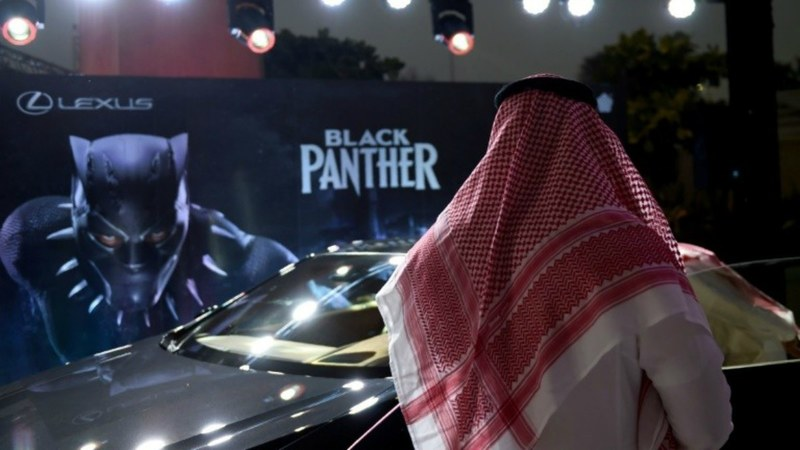After a longtime ban – spanning over three-decades – Saudi Arabia has re-introduce cinema into society. The decision is part of Crown Prince Mohammad bin Salman’s series of social reforms, as he brands himself a ‘modern’ and a ‘reformer’ in the international community. In reality, this is far from the case. The small steps he has taken are trivial when looking at the areas where Saudi Arabia still lacks basic human rights.
The ban on movie theaters was officially lifted in April 2018 with the screening of Marvel’s ‘Black Panther’, a movie that champions diversity and gender equality, both of which Saudi Arabia continues to repress. Unlike the progressive movie, the kingdom remains largely regressive – with systems in place that allow for the structural discrimination of ethnic and religious minorities and women.
In Saudi Arabia, migrants particularly face harsh treatment as a result of structural systems. The existing kafala system of labor sponsorship gives employers vast control over migrant workers. Under this system, the workers may not change jobs, quit their jobs, or leave the country without express permission from their sponsor, and their sponsor also has the power to cancel a migrant worker’s residence visa if the worker acts without permission. This power imbalance puts migrants at increased risk of abuse, unfair wages, and withholding of wages.
Among those racial and ethnic minorities that face particular discrimination are Saudis and Arabs of African descent. Saudis of African descent face prejudice that frames them as ‘inferior’ and they also face systematic racism and racial slurs. They often have fewer employment, education, and community leadership opportunities and typically live in segregated housing areas and occupy marginalized positions in society. Furthermore, it is common for businessmen receive fewer customers and workers to receive lower salaries due to their skin color.
Additionally, Saudi Arabia’s judicial system is structured in a manner that puts migrants at a disadvantage. Migrants face widespread due process violations, including long periods of detention without charge or trial, no legal assistance, pressure to sign confessions, and ineffective translation services. Migrants are also disproportionately targeted for non-violent crimes. At least 23 percent of those put to death in 2017 for drug offences were Pakistani nationals, which is a remarkably large proportion considering Pakistanis are estimated to make up just 6% of the overall Saudi population.
Similarly, religious minorities face abuse in Saudi Arabia. Recently, the United States Commission on International Religious Freedom’s (USCIRF) labeled Saudi Arabia a ‘Country of Particular Concern’ in its 2018 annual report. From a young age, students in Saudi schools are taught to be intolerant towards those perceived to be of a different faith. Official school textbooks contain hateful language toward religions and Islamic traditions that do not adhere to its interpretation of Sunni Islam – the religion of the ruling family. Shia Muslims make up the largest religious minority in the country, and are subjected to harsh and unfair treatment at the hands of the Saudi government.
The Saudi state has destroyed religious and cultural sites of significance to its Shia populace and has closed mosques used by the population, forcing many Shia to practice their beliefs in secret. The government also restricts public Shia practices, rituals, and festivals. Likewise, Shia are largely excluded from senior political positions and experience systematic discrimination in hiring, promotion, and firing practices in the regular workplace. Shia individuals, especially activists and clerics, also have been subjected to arrest, torture, and execution on politically-motivated charges.
Women perhaps face some of the most blatant inequalities in Saudi Arabia. While Crown Prince Mohammad bin Salman has made some cosmetic reforms, including lifting the driving ban and allowing women to attend sporting events, women still lack important freedoms. The kingdom’s nationality law discriminates against women by mandating that women cannot directly transmit citizenship to their children. This means that if the father is a noncitizen, the children will not receive Saudi citizenship. There are also no protections for young girls from forced marriages, as no minimum marriage age exists in Saudi Arabia.
At the root of gender inequality in Saudi Arabia is the system of male guardianship over women.Under this system, every woman must have a male guardian – usually a father or husband, but sometimes a brother or son – who is empowered to make important decisions on her behalf. While the king decreed an end to informal and extra-legal forms of guardianship in early 2017, the system remains in place and has been largely unchallenged. Women need a guardian’s permission in order to get married, travel internationally, get out of prison, or exit a shelter for abuse victims. More broadly, the system impacts the mundane realities of every Saudi woman’s life.
It truly is ironic that Saudi Arabia chose ‘Black Panther’ to break the 35-year ban on cinema, when the country clearly doesn’t live up to the ideals of diversity and gender equality highlighted in the movie. Mohammad bin Salman must start targeting the underlying systematic causes of inequality in the country in order to make significant reforms, and to ensure human rights and freedoms for all religions, ethnicities, and genders.
Monica Zuraw is an Advocacy Fellow at ADHRB





